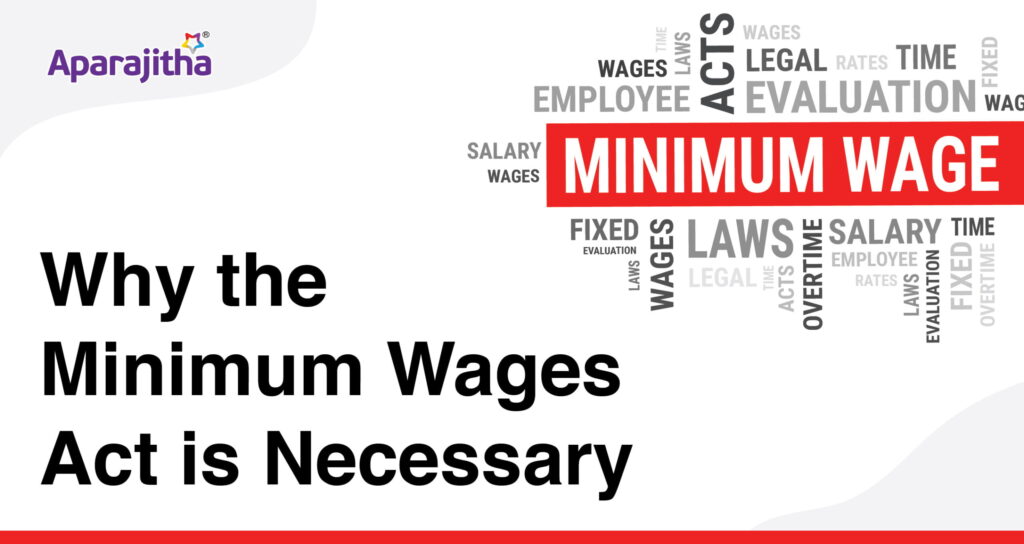The Minimum Wages Act, 1948, came into effect on March 15, 1948 with the purpose of ensuring that employers do not exploit employees and provide basic wages. These wages are considered to be essential for living a dignified life. The Act established a tripartite committee known as the Committee of Fair Wage. This committee plays a vital role in setting guidelines for minimum wage calculations, laying the foundation for wage fixation processes across the country. The minimum wage levels are determined based on factors such as the number of employees within an organization.
What is the difference between the salary and the wages?
Before we understand the importance of the Minimum Wages Act, we need to know how the wages differ from the salary. The difference between salary and wages lies in their nature, payment frequency, treatment of overtime, target employee groups, evaluation criteria, and legal definitions.
Definition for salary
Salary refers to a fixed amount of remuneration provided to an employee for the services they render. It is typically paid on a monthly basis and remains consistent regardless of the number of hours worked. Salary is commonly associated with positions requiring specific skills and qualifications.
Definition for wages
Wages represent a variable amount of payment based on the number of hours an employee works. Wages are often paid daily or hourly, reflecting the actual time spent on the job, and this payment structure is more common for semi-skilled/unskilled labours.
Overtime
In terms of overtime, salaried employees are typically not paid additional compensation for working beyond their regular working hours. In contrast, wage earners are entitled to overtime pay for any additional hours worked beyond the standard workday or workweek.
Evaluation
Salaries are generally provided to employees with established Key Result Areas (KRAs), which set performance expectations monthly or longer-term. Wages, however, are often evaluated based on the hourly work performed, with productivity and output being key factors in determining payment.
Legal perspective
From a legal perspective, salary is defined under section 17(1) of the Income Tax Act, 1961, which outlines the taxation of salaries. Wages, on the other hand, are defined under section 2(s) of the Payment of Wages Act, 1936, which governs the payment of wages to workers.
The Birth of the Minimum Wages Act
The Minimum Wages Act, 1948, is a cornerstone of worker protection in India, and it sets the minimum amount that organizations must pay employees for specific jobs at any given time. This comprehensive legislation safeguards workers’ rights and ensures fair wages that cannot be reduced by contract or collective agreement.
What is the purpose of the Minimum Wages Act, 1948?
The primary objective of this act is to make sure that every worker is paid the minimum wage allotted for the particular job.
Preventing Employee Exploitation
The Act aims to prevent employee exploitation by ensuring workers’ decent living standards. The government determines and revises the minimum wage rate every five years, considering proposals from advisory committees. The guidelines set by these committees must be implemented promptly to protect workers’ interests.
Amendments and Exceptions
Over time, the Act has undergone amendments to address evolving needs. For instance, the 2000 Amendment Act introduced changes to the minimum wage floor, and exceptions were made for specific employee categories. The lowest minimum wages are currently observed in Andhra Pradesh, Kerala, and Gujarat. Additionally, the Act provides for higher minimum wages for workers with disabilities, ensuring inclusivity in wage policies.
Consensus Building
The Act emphasizes consultation and consensus-building with relevant stakeholders. The Government is required to consult with the Committee and representatives of those affected by minimum wage regulations. This collaborative approach helps in determining fair and reasonable minimum wage rates.
Fixation and Revision of Minimum Rates
Minimum wage rates are fixed daily and apply nationwide, and the act provides their revision every five years, with periodic dearness allowances. Fixation of wages is guided by the principles outlined in the Act and the expertise of sector-specific wage committees appointed for different industries.
Does India have a non-compliance penalty?
The Indian Government has established a mechanism to ensure compliance with the code by appointing inspectors. The inspectors will conduct routine inspections to verify whether the companies are adhering to the provisions outlined in the code. The penalty for non-compliance with the code varies per the offense’s nature. The maximum penalty includes imprisonment for up to 3 months and a fine of Rs. 100,000.
It is paramount for every company to follow the wage norms set by the respective state governments and industries to ensure compliance. Inspections will likely be more stringent for companies with foreign investments, especially in labour unrest or violations.
When a worker is paid less than the minimum wage set by the respective state government, they can file a complaint with the labour inspectorate. A worker can submit a complaint individually with the help of a lawyer or through an official from a registered trade union.
Why is there no national minimum wage in India?
There are no national minimum wages in India due to the legislative framework and the distribution of authority between the state and central governments concerning labour and welfare matters.
The state and central governments have jurisdiction over labour-related issues, leading to a system of multi-jurisdictional regulation as per constitutional law. Earlier, only workers in specific industries, constituting around 40 per cent of the total workforce, were entitled to minimum wages.
However, despite the passage of the Wage Code Act in 2019, there have been no developments regarding bringing in the national minimum wage for Indian workers.
Hence, the Indian government has not prioritized the implementation of a national minimum wage plan, as it is a highly polarizing issue and could have adverse effects on employers, particularly in the post-pandemic period.
Further, the cost of living differs from one state to another, and since the minimum wages are determined based on various factors which are dependent upon the State you are in, the minimum wages also differ.
To wrap things up..
The Minimum Wages Act, 1948, is paramount for employers and employees. It establishes a framework to reduce the risk of worker exploitation and ensure a decent standard of living for all workers. Regular revision of minimum wages, consultations with stakeholders, and adherence to principles of fairness and inclusivity contribute to its effectiveness. Familiarity with this act is crucial for employers and employees to foster harmonious work environments and uphold workers’ rights in India.







